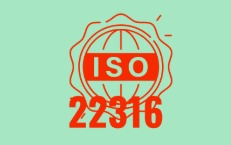In an unpredictable world where disruptions can arise from natural disasters, cyberattacks, pandemics, or economic instability, the ability of an organization to withstand and recover from unexpected challenges is crucial. This ability is known as organizational resilience — and to help organizations strengthen it, the International Organization for Standardization (ISO) introduced ISO 22316:2017 – Security and Resilience: Organizational Resilience – Principles and Attributes.
What is ISO 22316:2017?
ISO 22316:2017 provides a framework and guiding principles to help organizations enhance their resilience — the capacity to anticipate, prepare for, respond to, and adapt to both incremental changes and sudden disruptions. Unlike other ISO standards, ISO 22316 is not a certifiable standard but a guidance document that supports the development of strategies, leadership, and culture to make organizations stronger and more adaptable.
This standard applies to organizations of all types and sizes — public or private, large or small — and can be used alongside other management system standards such as ISO 22301 (Business Continuity Management), ISO 31000 (Risk Management), and ISO 9001 (Quality Management).
Objectives of ISO 22316
The primary goal of ISO 22316 is to build a resilient organizational culture that ensures sustainability, continuity, and long-term success. The key objectives include:
-
Strengthening an organization’s ability to respond effectively to disruptions.
-
Promoting a culture of continuous learning and adaptability.
-
Enhancing leadership and communication during crises.
-
Encouraging collaboration and innovation across teams and partners.
-
Ensuring the protection of people, assets, and reputation during adverse events.
Core Principles of ISO 22316
The standard identifies several principles and attributes that support resilience in any organization:
-
Shared Vision and Purpose: Everyone in the organization should understand and support the same mission and goals.
-
Effective Leadership: Strong leadership is essential to inspire confidence, make timely decisions, and maintain direction during crises.
-
Organizational Culture: A positive, adaptable, and learning-oriented culture helps employees respond effectively to change.
-
Information and Knowledge Management: Timely access to accurate information supports informed decision-making.
-
Resource Management: Efficient allocation of people, technology, and finances helps sustain operations during challenges.
-
Continuous Improvement: Organizations must regularly review and improve processes, learning from both successes and failures.
Benefits of Implementing ISO 22316
Implementing the principles of ISO 22316 offers numerous benefits to organizations aiming to enhance their resilience:
-
Improved Crisis Preparedness: Enables organizations to anticipate and manage disruptions more effectively.
-
Enhanced Business Continuity: Supports ongoing operations even in adverse conditions.
-
Stronger Reputation and Trust: Builds confidence among customers, employees, and stakeholders.
-
Increased Agility: Encourages flexibility and faster adaptation to changing environments.
-
Sustainable Growth: Creates a foundation for long-term organizational success and competitiveness.
Conclusion
In an era where uncertainty is the only constant, ISO 22316:2017 serves as a valuable guide for organizations seeking to strengthen their resilience. It helps create a culture of preparedness, adaptability, and continuous improvement — enabling organizations not just to survive disruptions, but to thrive in the face of them.
By adopting ISO 22316, businesses can ensure they are ready for the challenges of today and the unknowns of tomorrow, building a foundation of trust, stability, and sustainable success.






